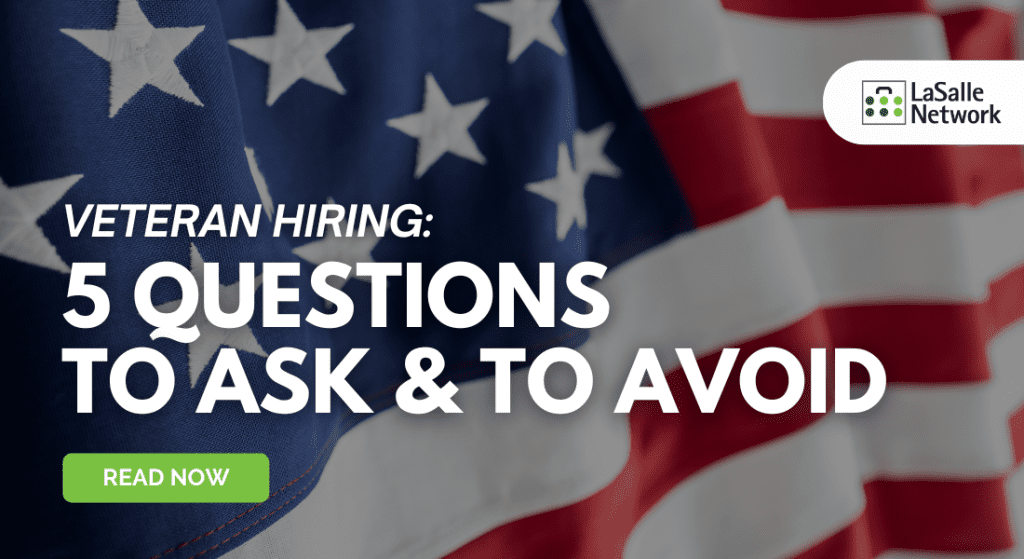Calling all Veterans and MilSpouses: if you are seeking career support in the transition to civilian life, we can help. Whether it be resume-writing advice, interviewing tips or to hear about the open positions we are recruiting for, sign up to speak with one of our trained military career coaches.
As part of an ongoing series addressing Diversity, Equity and Inclusion (DEI) in the workplace, we’ve created research-backed resources to provide information pertinent to both companies and individuals as they examine their role in impacting change. LaSalle Network’s veteran hiring initiative, LaSalle Veteran Network (LVN), is committing to helping 1,000 veterans find jobs, as well as providing resources for veterans and hiring managers to ease the transition.
Each year, approximately 200,000 men and women transition out of service and back into civilian life, with many who try to seek employment afterwards. While their background may be nontraditional, veterans have a unique skill set that makes them invaluable hires. Interviewing veterans, while not all that different from interviewing civilian candidates, has slightly different nuances that hiring managers should be aware of. Below, we share 5 questions to ask and 5 to avoid in your next veteran interview.
ASK: What branch did you serve in (Army, Navy, Marines, Coast Guard, Air Force or Space Force) and why did you choose that branch?
While veterans are often grouped together in the civilian world, Service Members typically serve in one of six very different branches of the military. Each branch has their own traditions, culture, terminology and mission, making their service experience very different. Service Members are very proud of the branch they served in, and while you do not need to know specifics about each branch, it is important to understand that not every veteran was a soldier, and each branch is unique.
DON’T Ask: Do you have PTSD?
Under the Americans With Disabilities Act, it’s illegal to ask this question to a candidate or employee. Not all veterans have PTSD, and it should not be asked unless certain conditions are met. When asked this question, veterans may feel stigmatized or discriminated against.
ASK: What was your role within the military?
Service Members have specific jobs within the military, with about 80% of those jobs corresponding directly with hundreds of different civilian jobs. Asking about what they did during their time in service can help you get a better picture of their background and skills, while allowing them to know you understand that not all Service Members are the same. While you do not necessarily need to know details about rankings, titles, or the day-to-day roles of military members, it is important to understand that Service Members have a very wide range of roles and career paths available to them, involving different training, formal education, years of experience and more.
DON’T ASK: Have you ever killed anyone?
This question can be offensive or disconcerting for veterans. This is a highly sensitive topic that demands privacy. Furthermore, don’t assume a veteran was in active combat or served in an active war zone. As discussed, there are many different roles within the military, with only about 10% including those in active combat positions. Even for those who did experience combat, be careful not to stereotype and ensure your questions are always respectful.
ASK: Can you relate your military career to what you want to do next?
Their role within the military may or may not correlate with the job they are applying to now, so inquire about what it is they are wanting in their next role and what inspired them to apply. Even if the role does not correlate, they likely have many transferrable skills learned from their role that could position them as a competitive candidate. Consider both the technical skills and soft skills learned through their time in service that may apply to the role they are interviewing for.
Keep in mind that not all veterans will be coming straight out of service but may have worked at other organizations or gone back to school since their time in uniform.
DON’T ASK: Have you ever been shot?
This question has the potential to touch on traumatic memories. Furthermore, this question could come across as belittling for the veteran who was not in combat but faced many other challenges and sacrifices. Asking questions such as these can perpetuate stereotypes and make veterans feel stigmatized.
ASK: What role did you take while collaborating in a group?
Because the military has a strong focus on group achievement, it may feel uncomfortable for many veterans to boast of personal achievements. Just because they do not share their individualized successes readily does not mean they did not play an integral role in their groups’ success. This question can help uncover more of their personal successes, skills and leadership qualities. While the military has a very defined chain of command, consider asking about how they collaborated with their peers.
DON’T ASK: Is it hard to get back to real life after being in the military?
A veteran’s time in service was a part of their real life and is likely very important to them. Each will face different challenges while adjusting to civilian life and may not want to disclose what those challenges are. Veterans may feel a varying degree of connection to their branch after leaving the service, and this may be a difficult or offensive question for some to answer. Instead, ask them how their military service shaped them and how their time in service factors in to how they define themselves now. These questions will provide more credibility and promote a better understanding.
ASK: Describe your ideal work environment.
Listen for whether they prefer to work alone or in teams, how comfortable they are using technology, and other aspects of the job that are important to your company and industry. While they have nontraditional backgrounds, it is important to ask veterans questions like this and others you would typically ask candidates in order to gauge if they are right for the role.
DON’T ASK: Was it difficult leaving your family for so long?
Veterans make many sacrifices in order to serve their country, which for some includes long periods of time away from their family. Service Members do not take these choices lightly, and this question may seem to insinuate the veteran cares less for their family or made a mistake when choosing to serve.
Too often people assume a level of familiarity with former military that not only breaches proper office conduct but also invades the veteran’s privacy or forces them into conversations that may be uncomfortable for them.
While recruiting veterans to your organization, consider training your HR and leadership team on how to find and interview veteran talent. Consider attending veteran job fairs, contacting a Veteran Employment Representative at an American Job Center, working with a recruiting firm with a strong veteran hiring program, or collaborating with university career centers that have veteran hiring programs. Ensure that your job requirements do not discourage veterans from applying. These candidates may not have industry experience or a background with specific software required for certain roles but may make up for it in other areas of specialized skills and experience.
Be wary of falling into stereotyping or making assumptions about veterans. Every individual is unique, has their own experiences, and brings a different set of skills and strengths to the table. Just like other candidates interviewed, not every veteran has the same experience or level of personal connection with the military. Lean on the many online resources and programs that provide information on veteran hiring.
Looking to hire veterans? Partner with LaSalle Veteran Network to get connected with talent and enhance your veteran hiring initiative.




